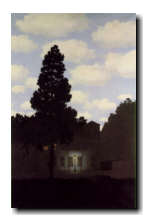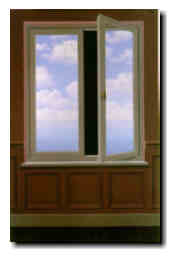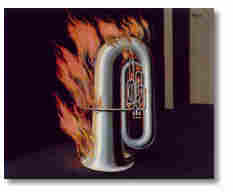


(1898-1976)
Like many of his French colleagues in the Surrealist movement, Magritte was deeply inspired by the work of Giorgio de Chirico in the early 1920s. Magritte was one of the important figures in the Belgian Surrealist movement that flourished between the wars and also frequently participated in activities initiated by Andre Breton in Paris.His paintings, with their emphasis on the disparity between the thinking and seeing processes, were regarded as among the purest elucidations of Surrealist philosophy.
MARGRITTE'S THOUGHTS ON ART
"To equate my painting with symbolism, conscious or unconscious, is to ignore its true nature. . . . People are quite willing to use objects with outlooking for any symbolic intention in them, but when they look at paintings,they can't find any use for them. So they hunt around for a meaning to get themselves out of the quandary, and because they don't understand what they are supposed to think when they confront the painting.... They want something to lean on, so they can be comfortable. They want something secure to hang on to, so they can save themselves from the void. People look for symbolic meanings fail to grasp the inherent poetry and mystery of the image. No doubt they sense this mystery, but they wish to get rid of it. They are afraid. By asking "what does this mean?" they express a wish that everything be understandable. But if one does not reject the mystery, one has quite a different response. One asks other things."
 "The images must be seen such as they
are. Moreover, my painting implies no supremacy of the invisible over the visible. (The
letter hidden in the envelope is not invisible; neither is the sun when it is hidden by a
curtain of trees.)The mind loves the unknown. It loves images whose meaning is
unknown,since the meaning of the mind itself is unknown. The mind doesn't under-stand its
own raison d'itre, and without understanding that (or why it knows what it knows), the
problems it poses have no raison d'etre either."
"The images must be seen such as they
are. Moreover, my painting implies no supremacy of the invisible over the visible. (The
letter hidden in the envelope is not invisible; neither is the sun when it is hidden by a
curtain of trees.)The mind loves the unknown. It loves images whose meaning is
unknown,since the meaning of the mind itself is unknown. The mind doesn't under-stand its
own raison d'itre, and without understanding that (or why it knows what it knows), the
problems it poses have no raison d'etre either."
"The word "dream" is often misused
concerning my painting. We certainly wish the realm of dreams to be respectable-but our
works are not oneiric.On the contrary. If "dreams" are concerned in this
context, they are very different from those we have while sleeping. It is a question
rather of self-willed "dreams," in which nothing is as vague as those feelings
one has when escaping in dreams ...... Dreams" which are not intended to make you
sleep but wake you up."
"If one is a determinist, one must believe always that one cause produces the same effect. I am not a determinist, but I don't believe in chance either. It serves as still another "explanation" of the world. The problem lies precisely"